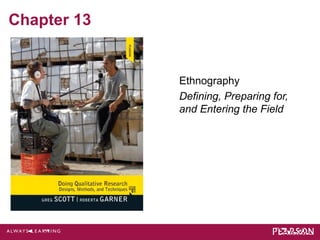More Related Content
Similar to Garner c13 (20)
More from Beulah Heights University
More from Beulah Heights University (20)
Garner c13
- 2. What Is Ethnography?
• The Field
– The ethnographer goes to a special place, the
field:
• And spends time there observing a culture and
writing about people
• Casting a Big Light with a Small Lamp
© 2013 Pearson Education, Inc. All rights reserved.
- 3. Getting Ready To Get Close:
Planning For Ethnographic Work
• Doing Your Homework: Background
Research
• Reflexivity Exercises: Placing Your Vague
Preconceptions in a Vivid Foreground
– Map Your Biases; Define Your Goals
• Asking Questions and Planning to Seek
Answers
© 2013 Pearson Education, Inc. All rights reserved.
- 4. Getting Ready To Get Close:
Planning For Ethnographic Work
• Prepare for Your Role on a Stage Not
Your Own
– Relating; Reflecting On Relating
– Retaining—learning To Recall Like An Actor
Delivering Lines
– Reducing: What Gets Left Out Or Changed
When You Write Field Notes?
© 2013 Pearson Education, Inc. All rights reserved.
- 5. Getting Ready To Get Close:
Planning For Ethnographic Work
• Reflecting on Reduction and Recognizing
Your Blinders! A Preparatory Exercise
– Pick a subject—a stranger, a family member,
or a friend—and ask the person if you could:
• Interview her for 15 minutes about some topic that
interests you; the actual topic doesn’t really matter
– Record the interview
© 2013 Pearson Education, Inc. All rights reserved.
- 6. Thinking About Your Project: The
Logic Of Ethnographic Discovery
• It’s important to keep in mind that you’re
seeking to understand patterns of
behavior
– You want to ask questions and seek answers
concerning variation within a culture
• Follow good practices in design/methods
• Think about how your project is going to
yield knowledge of a culture
© 2013 Pearson Education, Inc. All rights reserved.
- 7. Mental Habits Of Ethnographers
• Sameness and Difference: Not the Same
Difference
• Generalizing from Your Sample of One:
Culture X
• Iterative Recursive Abduction
– Iterative And Recursive
© 2013 Pearson Education, Inc. All rights reserved.
- 8. Mental Habits Of Ethnographers
– Abductive
• Speculation, Imagination, and Surprise
– How To Guess
– The “A-ha!” Experience
– Talking To Yourself
• Maintaining the Capacity to Be Surprised
© 2013 Pearson Education, Inc. All rights reserved.
- 9. Entering The Field
• New People
– Gatekeepers, Stranger-handlers, And Public
Characters
– Subjects, Respondents, And Informants
– When The Key Informant Becomes A Friend
• Knowing When to Keep Quiet
© 2013 Pearson Education, Inc. All rights reserved.
- 10. Entering The Field
• New People
– Gatekeepers, Stranger-handlers, And Public
Characters
– Subjects, Respondents, And Informants
– When The Key Informant Becomes A Friend
• Knowing When to Keep Quiet
© 2013 Pearson Education, Inc. All rights reserved.
